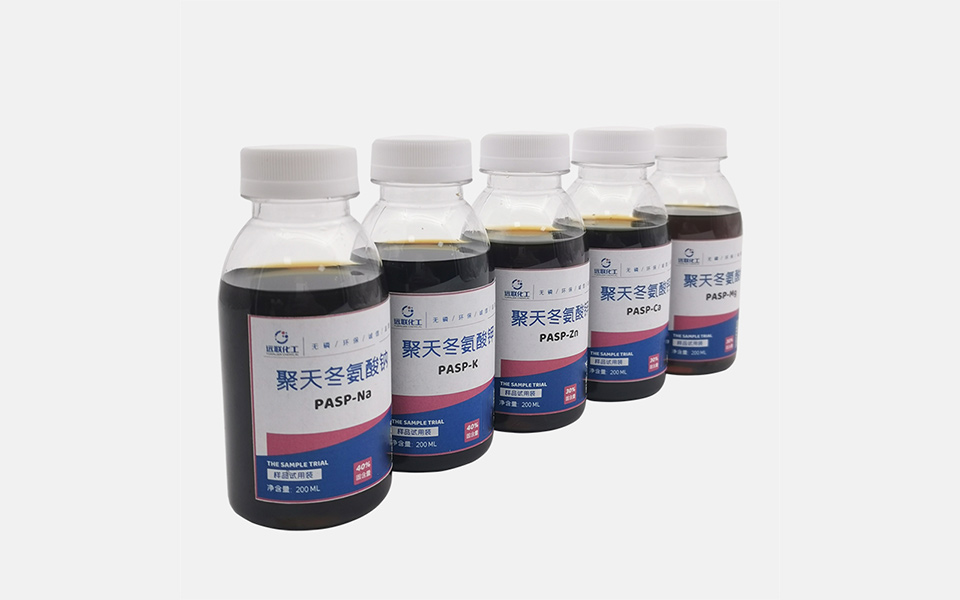
Evaluation of the efficacy of sodium polyaspartate in the field of hair care
Application of sodium polyaspartate in the field of hair care
Sodium polyaspartate has the effects of nutrition, repair and moisturizing, and makes hair easy to comb and soft. The repair effect of sodium polyaspartate (PASP) with different mass fractions and different molecular weights on damaged hair was studied by scanning electron microscopy and contact angle tester. The results showed that the gloss of hair was improved, the contact angle was increased, and the hair surface became hydrophobic after repair with high molecular weight sodium polyaspartate with a mass fraction of 1%. The effect of high molecular weight sodium polyaspartate with different mass fractions on the combability and softness of hair was studied by INSTRON tensile testing machine and ASHLAND SLT components. The results showed that the hair was easy to comb and soft after being treated with high molecular weight sodium polyaspartate with a mass fraction of 0.4%.
With the continuous improvement of living standards, more and more consumers are pursuing healthy, bright and soft hair. However, perming, dyeing, air pollution, etc. will cause the destruction of the keratin network inside the hair fiber, weaken the moisturizing ability of the hair, and the loss of water will cause the hair to become dry, split, stiff and even fall out. Therefore, consumers have higher requirements for the moisturizing and repairing effects of hair care products, and the research on new moisturizing factors and nutritional repair substances has also received more and more attention.
Currently, the moisturizers and conditioners used for hair care include cationic surfactants, silicone oils, and silk peptides. Cationic surfactants have unique neutralizing and water-retaining effects, which can reduce static electricity in hair and make hair soft, but may cause irritation and compatibility problems; silicone oil can smooth hair scales and reduce friction of hair, making hair easier to comb and making hair soft, but because silicone oil is insoluble in water, excessive deposition on the scalp may cause clogging of hair follicles and affect the health of the scalp and hair; silk peptides have excellent moisture absorption and affinity, and have the function of repairing damage, but it is difficult to fully understand the essential factors of sericin hair care at the molecular level, which limits its further application.
Polyaspartic acid (sodium) (Polyaspartic acid, PASP) is a high molecular amino acid polymer composed of L-aspartic acid as a unit body, with good hydrophilicity and water solubility. It can combine with hydrogen in water molecules, has extremely strong water-locking and moisturizing properties and high-efficiency moisturizing effects, replenishes moisture for hair, and makes hair soft and shiny. At the same time, it has the properties of long-chain proteins, which can significantly repair hair damage and play a role in nutritional repair and protection.

This paper will systematically study the effects of sodium polyaspartate on hair damage repair, combing, softness and smoothness, and explore the effects of the molecular weight and mass fraction of sodium polyaspartate in hair care.
Experiments show that 0.4% and 1% Compared with PASP, the blank has obvious improvement, but when the mass fraction is 3%, the combing work increases and the combing property becomes worse. There may be two reasons. First, due to the excessively high PASP content, the number of positive charges increases, and the negative charges on the hair surface have been combined with the positive charges, and there are no extra negative charges to combine with them, so that the hair surface has positive charges, the combing resistance increases and the combing property becomes worse; second, due to the sedimentation of the sample, the PASP content is too high and cannot be completely absorbed by the hair. It is deposited on the hair surface, which makes the hair feel heavy and causes the combing property to deteriorate. Therefore, 0.4% PASP is the most suitable when added.
Hair softness
Hair softness is related to moisturizing. The higher the water content in the hair, the lower the degree of hydrogen bond formation between keratin and within keratin. The lower the degree, the softer the hair). The softness is measured by INSTRON & SLT components. When the sleeve in the SLT component is in a state where it can rotate freely, the measured total energy is used to characterize the softness of the hair. In this experiment, the work and friction between the hair and the sleeve are used to characterize it. The friction force measured in the experiment is dynamic friction, and the first peak point of the movement is the maximum static friction.
From the experiment, it can be seen that the maximum static friction of the hair treated with 0.4% PASP is slightly lower than that of the blank hair, and the total work is also lower than that of the blank group, indicating that the treated hair is softer than the untreated hair; the maximum static friction of the hair treated with 1% and 3% PASP is higher than that of the blank hair, and with the increase of mass fraction, the maximum static friction and total work both increase, indicating that the untreated hair is softer than the treated hair.
YUANLAIN CHEMICAL is a leading manufacturer of sodium polyaspartate. Any needs feel free to contact Tel: +86 537 3739818; Email: [email protected].
Yuanlian Chemical specializes in the production of polyaspartic acid (PASP),tetrasodium iminodisuccinate(IDS), GLDA, MGDA etc. with stable quality and excellent quantity!





Contact us